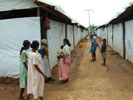 A new report by the Internal Displacement Monitoring Centre, or IDMC, indicates that the number of internally displaced persons, or IDPs, remained at a record high in 2008 —26 million people were displaced within their own countries, mostly due to violence. The tally is the same as in 2007, which was a record since the early 1990s, but some concerning trends are emerging.
A new report by the Internal Displacement Monitoring Centre, or IDMC, indicates that the number of internally displaced persons, or IDPs, remained at a record high in 2008 —26 million people were displaced within their own countries, mostly due to violence. The tally is the same as in 2007, which was a record since the early 1990s, but some concerning trends are emerging.
The Philippines had the largest number of new IDPs in 2008. Some 600,000 people fled their homes due to fighting between the government and rebels. Other countries where large numbers of people were newly displaced in 2008 include, Kenya, Democratic Republic of Congo, Iraq, Pakistan, Somalia, Columbia, Sri Lanka, and India. Sudan tops the list, with a total of 4.9 million people displaced. Internal displacement affects all regions of the world and is not limited to countries, like Iraq, that remain at war.
To put 26 million internally displaced people in perspective: the figure is more than twice the population of Zimbabwe.
On both the global and the national scales, IDPs remain a challenging issue. While massive movements of people within countries fundamentally change their populations, the international community remains unsure about what to do about it. Indeed, the IDMC report states that while 52 countries are affected by internal displacement, only 14 countries have legislation or policies that specifically address the issue.
With new countries affected in 2008, it’s clear that internal displacement will be a persistent problem. In fact, we may even see the number of displaced people increase as countries become more restrictive at their borders and fewer people are able to cross into countries and claim refugee status. John Holmes, the head of the U.N.’s humanitarian operations, elaborated:
The number of internally displaced will rise significantly due to anticipated increases in the intensity and frequency of natural disasters. That is why we need to focus urgently on finding appropriate solutions for IDPs to end their displacement and their dependence on relief assistance.

